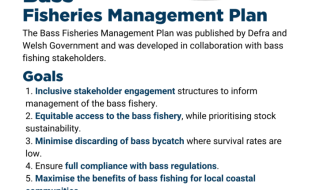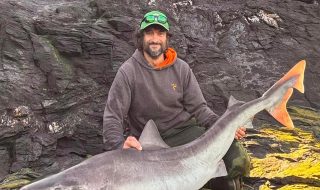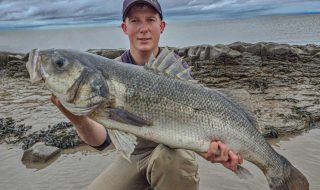Fisheries Minister George Eustice, who has been strongly criticised by UK angling organisations for caving in to pressure from commercial fishing interests and supporting exemptions to the European Union bass fishing moratorium for the highly damaging bass gill net fishery, is now under fire for making false claims for the impacts on threatened stocks as a result of the decisions he supported last month at the European Union.
The £200 million recreational angling bass sector has now been banned from keeping any bass whatsoever for personal consumption in the first six months of 2016 and in the second half of the year the daily bag limit for anglers will be reduced from three fish to just one. At the same time the gill net fishery (with the exception of drift nets), which is actually responsible for over half of all bass landings, will now only be closed for two months of the year (February and March) rather than six as was planned in the proposed EU moratorium on all bass fishing.
A 14,000 strong petition, supported by TV presenters Matt Hayes and Henry Gilbey, has now received a formal response from the government which has angered anglers still further. Mr Eustice and his officials at Defra are claiming that they have not ‘watered down’ the Commission’s proposed six-month moratorium because drift netting, that Defra claim is responsible for 90% of all bass caught with nets, will cease during this period. Unfortunately for the minister, data published by his own department shows this to be untrue.
The government’s own Marine Management Organisation (MMO) has published landings data for 2014 showing that netting constitutes some 62% of all commercial bass catches with drift netting being responsible for 20% – equivalent to just one-third of all netting – not the 90% claimed by Mr Eustice in an article for Fishing News.
Further studies show how nonsensical the government’s claims really are. A report commissioned by SEA FISH, in which both the MMO and Defra fully participated, was published in June 2014 stating that the entire UK drift net catch of all species was worth less than £1 million at first sale landing. Annual bass landings from netting averaged 361 tonnes between 2010 – 2013 and 90% equates to 325 tonnes, so if the 90% was credible, bass landings alone from drift nets would be worth over £2 million.
Going back further, the CEFAS analysis of the 2010 bass fishery showed that only 11 tonnes of the 719 total bass landings were listed under drift nets.
Commenting on the obvious discrepancies in the claims made by Mr Eustice, longtime bass campaigner and Conservation Officer for the Cornish Federation of Sea Anglers, Malcolm Gilbert, said:
“The claims made by the minister about the impact of the wholly unjustifiable exemptions that he negotiated for bass gill netting have been unravelled by the government’s own figures. Far from being ‘low impact’ fixed gill nets are the most damaging form of commercial fishing and have contributed to the crash in bass stocks.
“George Eustice has even boasted about these measures having very little effect and he certainly made sure of that by supporting a monthly catch increase from one tonne to 1.3 tonnes per vessel and ensuring that the EU moratorium only applied to them in February and March – the two months when they hardly catch bass in any case.
“Cornish sea anglers, along with anglers across the country, are angry and dismayed that George Eustice has supported new legislation prohibiting them from taking any bass for the first six months of 2016 whilst at the same time allowing and even increasing the amount that commercial gill netting vessels can take during four of those same six months. Even non-anglers consider the erosion of the public right to catch a fish for their supper, a right that has existed since Magna Carta, to be indefensible.”
Angling writer and photographer Henry Gilbey said:
“As an angler who works as a writer/photographer within sport fishing, the lack of simple human logic being applied to the whole bass stocks issue staggers me. Sport fishing for bass is worth far more to the economy than commercial fishing for them, yet as sport fishermen we once again find ourselves clutching at scraps from the table. Give us anglers more and bigger bass to catch and even more anglers will fish for bass and therefore spend even more money doing so. Simple really.”
The Angling Trust, the national representative body for angling, has been equally dismissive of the government’s claims.
National Campaigns Coordinator Martin Salter said: “In the face of yet more worrying advice from the scientists about declining bass stocks we were braced for further measures and could have lived with a slight reduction in anglers’ bag limits if it wasn’t for the ludicrous exemption granted to the gill netters who, far from being ‘low impact’ as the minister claims, are actually responsible for nearly half of all UK bass landings.
“The fact that the government is now playing fast and lose with the facts will only further alienate thousands of anglers who do the least harm to fish stocks and who deliver the highest economic benefit to their local communities. Without any justification, sea anglers have been hardest hit whilst the least sustainable forms of harvesting have been given the green light to kill more bass. All this at a time when we are supposed to be conserving and rebuilding a threatened stock.
“I’ve never seen sea anglers so angry and when government ministers start making false, and easily disproved claims, they are hardly likely to be placated any time soon.”
The bass issue was the subject of an investigation by this week’s BBC TV Countryfile programme which can be seen here






